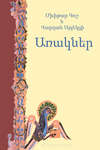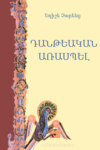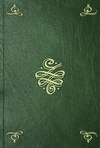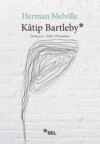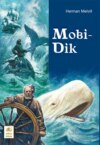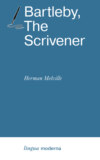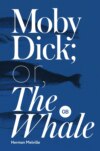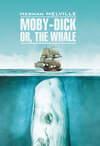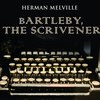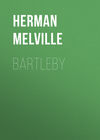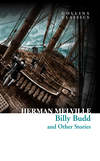Kitabı oku: «Moby Dick», sayfa 15
CHAPTER 37. Sunset.
THE CABIN; BY THE STERN WINDOWS; AHAB SITTING ALONE, AND GAZING OUT.
I leave a white and turbid wake; pale waters, paler cheeks, where'er I sail. The envious billows sidelong swell to whelm my track; let them; but first I pass.
Yonder, by ever-brimming goblet's rim, the warm waves blush like wine. The gold brow plumbs the blue. The diver sun-slow dived from noon-goes down; my soul mounts up! she wearies with her endless hill. Is, then, the crown too heavy that I wear? this Iron Crown of Lombardy. Yet is it bright with many a gem; I the wearer, see not its far flashings; but darkly feel that I wear that, that dazzlingly confounds. 'Tis iron-that I know-not gold. 'Tis split, too-that I feel; the jagged edge galls me so, my brain seems to beat against the solid metal; aye, steel skull, mine; the sort that needs no helmet in the most brain-battering fight!
Dry heat upon my brow? Oh! time was, when as the sunrise nobly spurred me, so the sunset soothed. No more. This lovely light, it lights not me; all loveliness is anguish to me, since I can ne'er enjoy. Gifted with the high perception, I lack the low, enjoying power; damned, most subtly and most malignantly! damned in the midst of Paradise! Good night-good night! (WAVING HIS HAND, HE MOVES FROM THE WINDOW.)
'Twas not so hard a task. I thought to find one stubborn, at the least; but my one cogged circle fits into all their various wheels, and they revolve. Or, if you will, like so many ant-hills of powder, they all stand before me; and I their match. Oh, hard! that to fire others, the match itself must needs be wasting! What I've dared, I've willed; and what I've willed, I'll do! They think me mad-Starbuck does; but I'm demoniac, I am madness maddened! That wild madness that's only calm to comprehend itself! The prophecy was that I should be dismembered; and-Aye! I lost this leg. I now prophesy that I will dismember my dismemberer. Now, then, be the prophet and the fulfiller one. That's more than ye, ye great gods, ever were. I laugh and hoot at ye, ye cricket-players, ye pugilists, ye deaf Burkes and blinded Bendigoes! I will not say as schoolboys do to bullies-Take some one of your own size; don't pommel ME! No, ye've knocked me down, and I am up again; but YE have run and hidden. Come forth from behind your cotton bags! I have no long gun to reach ye. Come, Ahab's compliments to ye; come and see if ye can swerve me. Swerve me? ye cannot swerve me, else ye swerve yourselves! man has ye there. Swerve me? The path to my fixed purpose is laid with iron rails, whereon my soul is grooved to run. Over unsounded gorges, through the rifled hearts of mountains, under torrents' beds, unerringly I rush! Naught's an obstacle, naught's an angle to the iron way!
CHAPTER 38. Dusk.
BY THE MAINMAST; STARBUCK LEANING AGAINST IT.
My soul is more than matched; she's overmanned; and by a madman! Insufferable sting, that sanity should ground arms on such a field! But he drilled deep down, and blasted all my reason out of me! I think I see his impious end; but feel that I must help him to it. Will I, nill I, the ineffable thing has tied me to him; tows me with a cable I have no knife to cut. Horrible old man! Who's over him, he cries;-aye, he would be a democrat to all above; look, how he lords it over all below! Oh! I plainly see my miserable office,—to obey, rebelling; and worse yet, to hate with touch of pity! For in his eyes I read some lurid woe would shrivel me up, had I it. Yet is there hope. Time and tide flow wide. The hated whale has the round watery world to swim in, as the small gold-fish has its glassy globe. His heaven-insulting purpose, God may wedge aside. I would up heart, were it not like lead. But my whole clock's run down; my heart the all-controlling weight, I have no key to lift again.
A BURST OF REVELRY FROM THE FORECASTLE.
Oh, God! to sail with such a heathen crew that have small touch of human mothers in them! Whelped somewhere by the sharkish sea. The white whale is their demigorgon. Hark! the infernal orgies! that revelry is forward! mark the unfaltering silence aft! Methinks it pictures life. Foremost through the sparkling sea shoots on the gay, embattled, bantering bow, but only to drag dark Ahab after it, where he broods within his sternward cabin, builded over the dead water of the wake, and further on, hunted by its wolfish gurglings. The long howl thrills me through! Peace! ye revellers, and set the watch! Oh, life! 'tis in an hour like this, with soul beat down and held to knowledge,—as wild, untutored things are forced to feed-Oh, life! 'tis now that I do feel the latent horror in thee! but 'tis not me! that horror's out of me! and with the soft feeling of the human in me, yet will I try to fight ye, ye grim, phantom futures! Stand by me, hold me, bind me, O ye blessed influences!
CHAPTER 39. First Night Watch.
Fore-Top.
(STUBB SOLUS, AND MENDING A BRACE.)
Ha! ha! ha! ha! hem! clear my throat!—I've been thinking over it ever since, and that ha, ha's the final consequence. Why so? Because a laugh's the wisest, easiest answer to all that's queer; and come what will, one comfort's always left-that unfailing comfort is, it's all predestinated. I heard not all his talk with Starbuck; but to my poor eye Starbuck then looked something as I the other evening felt. Be sure the old Mogul has fixed him, too. I twigged it, knew it; had had the gift, might readily have prophesied it-for when I clapped my eye upon his skull I saw it. Well, Stubb, WISE Stubb-that's my title-well, Stubb, what of it, Stubb? Here's a carcase. I know not all that may be coming, but be it what it will, I'll go to it laughing. Such a waggish leering as lurks in all your horribles! I feel funny. Fa, la! lirra, skirra! What's my juicy little pear at home doing now? Crying its eyes out?—Giving a party to the last arrived harpooneers, I dare say, gay as a frigate's pennant, and so am I-fa, la! lirra, skirra! Oh-
We'll drink to-night with hearts as light, To love, as gay and fleeting As bubbles that swim, on the beaker's brim, And break on the lips while meeting.
A brave stave that-who calls? Mr. Starbuck? Aye, aye, sir-(ASIDE) he's my superior, he has his too, if I'm not mistaken.-Aye, aye, sir, just through with this job-coming.
CHAPTER 40. Midnight, Forecastle.
HARPOONEERS AND SAILORS.
(FORESAIL RISES AND DISCOVERS THE WATCH STANDING, LOUNGING, LEANING, AND LYING IN VARIOUS ATTITUDES, ALL SINGING IN CHORUS.)
Farewell and adieu to you, Spanish ladies!
Farewell and adieu to you, ladies of Spain!
Our captain's commanded.–
1ST NANTUCKET SAILOR. Oh, boys, don't be sentimental; it's bad for the digestion! Take a tonic, follow me! (SINGS, AND ALL FOLLOW)
Our captain stood upon the deck,
A spy-glass in his hand,
A viewing of those gallant whales
That blew at every strand.
Oh, your tubs in your boats, my boys,
And by your braces stand,
And we'll have one of those fine whales,
Hand, boys, over hand!
So, be cheery, my lads! may your hearts never fail!
While the bold harpooner is striking the whale!
MATE'S VOICE FROM THE QUARTER-DECK. Eight bells there, forward!
2ND NANTUCKET SAILOR. Avast the chorus! Eight bells there! d'ye hear, bell-boy? Strike the bell eight, thou Pip! thou blackling! and let me call the watch. I've the sort of mouth for that-the hogshead mouth. So, so, (THRUSTS HIS HEAD DOWN THE SCUTTLE,) Star-bo-l-e-e-n-s, a-h-o-y! Eight bells there below! Tumble up!
DUTCH SAILOR. Grand snoozing to-night, maty; fat night for that. I mark this in our old Mogul's wine; it's quite as deadening to some as filliping to others. We sing; they sleep-aye, lie down there, like ground-tier butts. At 'em again! There, take this copper-pump, and hail 'em through it. Tell 'em to avast dreaming of their lasses. Tell 'em it's the resurrection; they must kiss their last, and come to judgment. That's the way-THAT'S it; thy throat ain't spoiled with eating Amsterdam butter.
FRENCH SAILOR. Hist, boys! let's have a jig or two before we ride to anchor in Blanket Bay. What say ye? There comes the other watch. Stand by all legs! Pip! little Pip! hurrah with your tambourine!
PIP. (SULKY AND SLEEPY) Don't know where it is.
FRENCH SAILOR. Beat thy belly, then, and wag thy ears. Jig it, men, I say; merry's the word; hurrah! Damn me, won't you dance? Form, now, Indian-file, and gallop into the double-shuffle? Throw yourselves! Legs! legs!
ICELAND SAILOR. I don't like your floor, maty; it's too springy to my taste. I'm used to ice-floors. I'm sorry to throw cold water on the subject; but excuse me.
MALTESE SAILOR. Me too; where's your girls? Who but a fool would take his left hand by his right, and say to himself, how d'ye do? Partners! I must have partners!
SICILIAN SAILOR. Aye; girls and a green!—then I'll hop with ye; yea, turn grasshopper!
LONG-ISLAND SAILOR. Well, well, ye sulkies, there's plenty more of us. Hoe corn when you may, say I. All legs go to harvest soon. Ah! here comes the music; now for it!
AZORE SAILOR. (ASCENDING, AND PITCHING THE TAMBOURINE UP THE SCUTTLE.) Here you are, Pip; and there's the windlass-bitts; up you mount! Now, boys! (THE HALF OF THEM DANCE TO THE TAMBOURINE; SOME GO BELOW; SOME SLEEP OR LIE AMONG THE COILS OF RIGGING. OATHS A-PLENTY.)
AZORE SAILOR. (DANCING) Go it, Pip! Bang it, bell-boy! Rig it, dig it, stig it, quig it, bell-boy! Make fire-flies; break the jinglers!
PIP. Jinglers, you say?—there goes another, dropped off; I pound it so.
CHINA SAILOR. Rattle thy teeth, then, and pound away; make a pagoda of thyself.
FRENCH SAILOR. Merry-mad! Hold up thy hoop, Pip, till I jump through it! Split jibs! tear yourselves!
TASHTEGO. (QUIETLY SMOKING) That's a white man; he calls that fun: humph! I save my sweat.
OLD MANX SAILOR. I wonder whether those jolly lads bethink them of what they are dancing over. I'll dance over your grave, I will-that's the bitterest threat of your night-women, that beat head-winds round corners. O Christ! to think of the green navies and the green-skulled crews! Well, well; belike the whole world's a ball, as you scholars have it; and so 'tis right to make one ballroom of it. Dance on, lads, you're young; I was once.
3D NANTUCKET SAILOR. Spell oh!—whew! this is worse than pulling after whales in a calm-give us a whiff, Tash.
(THEY CEASE DANCING, AND GATHER IN CLUSTERS. MEANTIME THE SKY DARKENS-THE WIND RISES.)
LASCAR SAILOR. By Brahma! boys, it'll be douse sail soon. The sky-born, high-tide Ganges turned to wind! Thou showest thy black brow, Seeva!
MALTESE SAILOR. (RECLINING AND SHAKING HIS CAP.) It's the waves-the snow's caps turn to jig it now. They'll shake their tassels soon. Now would all the waves were women, then I'd go drown, and chassee with them evermore! There's naught so sweet on earth-heaven may not match it!—as those swift glances of warm, wild bosoms in the dance, when the over-arboring arms hide such ripe, bursting grapes.
SICILIAN SAILOR. (RECLINING.) Tell me not of it! Hark ye, lad-fleet interlacings of the limbs-lithe swayings-coyings-flutterings! lip! heart! hip! all graze: unceasing touch and go! not taste, observe ye, else come satiety. Eh, Pagan? (NUDGING.)
TAHITAN SAILOR. (RECLINING ON A MAT.) Hail, holy nakedness of our dancing girls!—the Heeva-Heeva! Ah! low veiled, high palmed Tahiti! I still rest me on thy mat, but the soft soil has slid! I saw thee woven in the wood, my mat! green the first day I brought ye thence; now worn and wilted quite. Ah me!—not thou nor I can bear the change! How then, if so be transplanted to yon sky? Hear I the roaring streams from Pirohitee's peak of spears, when they leap down the crags and drown the villages?—The blast! the blast! Up, spine, and meet it! (LEAPS TO HIS FEET.)
PORTUGUESE SAILOR. How the sea rolls swashing 'gainst the side! Stand by for reefing, hearties! the winds are just crossing swords, pell-mell they'll go lunging presently.
DANISH SAILOR. Crack, crack, old ship! so long as thou crackest, thou holdest! Well done! The mate there holds ye to it stiffly. He's no more afraid than the isle fort at Cattegat, put there to fight the Baltic with storm-lashed guns, on which the sea-salt cakes!
4TH NANTUCKET SAILOR. He has his orders, mind ye that. I heard old Ahab tell him he must always kill a squall, something as they burst a waterspout with a pistol-fire your ship right into it!
ENGLISH SAILOR. Blood! but that old man's a grand old cove! We are the lads to hunt him up his whale!
ALL. Aye! aye!
OLD MANX SAILOR. How the three pines shake! Pines are the hardest sort of tree to live when shifted to any other soil, and here there's none but the crew's cursed clay. Steady, helmsman! steady. This is the sort of weather when brave hearts snap ashore, and keeled hulls split at sea. Our captain has his birthmark; look yonder, boys, there's another in the sky-lurid-like, ye see, all else pitch black.
DAGGOO. What of that? Who's afraid of black's afraid of me! I'm quarried out of it!
SPANISH SAILOR. (ASIDE.) He wants to bully, ah!—the old grudge makes me touchy (ADVANCING.) Aye, harpooneer, thy race is the undeniable dark side of mankind-devilish dark at that. No offence.
DAGGOO (GRIMLY). None.
ST. JAGO'S SAILOR. That Spaniard's mad or drunk. But that can't be, or else in his one case our old Mogul's fire-waters are somewhat long in working.
5TH NANTUCKET SAILOR. What's that I saw-lightning? Yes.
SPANISH SAILOR. No; Daggoo showing his teeth.
DAGGOO (SPRINGING). Swallow thine, mannikin! White skin, white liver!
SPANISH SAILOR (MEETING HIM). Knife thee heartily! big frame, small spirit!
ALL. A row! a row! a row!
TASHTEGO (WITH A WHIFF). A row a'low, and a row aloft-Gods and men-both brawlers! Humph!
BELFAST SAILOR. A row! arrah a row! The Virgin be blessed, a row! Plunge in with ye!
ENGLISH SAILOR. Fair play! Snatch the Spaniard's knife! A ring, a ring!
OLD MANX SAILOR. Ready formed. There! the ringed horizon. In that ring Cain struck Abel. Sweet work, right work! No? Why then, God, mad'st thou the ring?
MATE'S VOICE FROM THE QUARTER-DECK. Hands by the halyards! in top-gallant sails! Stand by to reef topsails!
ALL. The squall! the squall! jump, my jollies! (THEY SCATTER.)
PIP (SHRINKING UNDER THE WINDLASS). Jollies? Lord help such jollies! Crish, crash! there goes the jib-stay! Blang-whang! God! Duck lower, Pip, here comes the royal yard! It's worse than being in the whirled woods, the last day of the year! Who'd go climbing after chestnuts now? But there they go, all cursing, and here I don't. Fine prospects to 'em; they're on the road to heaven. Hold on hard! Jimmini, what a squall! But those chaps there are worse yet-they are your white squalls, they. White squalls? white whale, shirr! shirr! Here have I heard all their chat just now, and the white whale-shirr! shirr!—but spoken of once! and only this evening-it makes me jingle all over like my tambourine-that anaconda of an old man swore 'em in to hunt him! Oh, thou big white God aloft there somewhere in yon darkness, have mercy on this small black boy down here; preserve him from all men that have no bowels to feel fear!
CHAPTER 41. Moby Dick.
I, Ishmael, was one of that crew; my shouts had gone up with the rest; my oath had been welded with theirs; and stronger I shouted, and more did I hammer and clinch my oath, because of the dread in my soul. A wild, mystical, sympathetical feeling was in me; Ahab's quenchless feud seemed mine. With greedy ears I learned the history of that murderous monster against whom I and all the others had taken our oaths of violence and revenge.
For some time past, though at intervals only, the unaccompanied, secluded White Whale had haunted those uncivilized seas mostly frequented by the Sperm Whale fishermen. But not all of them knew of his existence; only a few of them, comparatively, had knowingly seen him; while the number who as yet had actually and knowingly given battle to him, was small indeed. For, owing to the large number of whale-cruisers; the disorderly way they were sprinkled over the entire watery circumference, many of them adventurously pushing their quest along solitary latitudes, so as seldom or never for a whole twelvemonth or more on a stretch, to encounter a single news-telling sail of any sort; the inordinate length of each separate voyage; the irregularity of the times of sailing from home; all these, with other circumstances, direct and indirect, long obstructed the spread through the whole world-wide whaling-fleet of the special individualizing tidings concerning Moby Dick. It was hardly to be doubted, that several vessels reported to have encountered, at such or such a time, or on such or such a meridian, a Sperm Whale of uncommon magnitude and malignity, which whale, after doing great mischief to his assailants, had completely escaped them; to some minds it was not an unfair presumption, I say, that the whale in question must have been no other than Moby Dick. Yet as of late the Sperm Whale fishery had been marked by various and not unfrequent instances of great ferocity, cunning, and malice in the monster attacked; therefore it was, that those who by accident ignorantly gave battle to Moby Dick; such hunters, perhaps, for the most part, were content to ascribe the peculiar terror he bred, more, as it were, to the perils of the Sperm Whale fishery at large, than to the individual cause. In that way, mostly, the disastrous encounter between Ahab and the whale had hitherto been popularly regarded.
And as for those who, previously hearing of the White Whale, by chance caught sight of him; in the beginning of the thing they had every one of them, almost, as boldly and fearlessly lowered for him, as for any other whale of that species. But at length, such calamities did ensue in these assaults-not restricted to sprained wrists and ankles, broken limbs, or devouring amputations-but fatal to the last degree of fatality; those repeated disastrous repulses, all accumulating and piling their terrors upon Moby Dick; those things had gone far to shake the fortitude of many brave hunters, to whom the story of the White Whale had eventually come.
Nor did wild rumors of all sorts fail to exaggerate, and still the more horrify the true histories of these deadly encounters. For not only do fabulous rumors naturally grow out of the very body of all surprising terrible events,—as the smitten tree gives birth to its fungi; but, in maritime life, far more than in that of terra firma, wild rumors abound, wherever there is any adequate reality for them to cling to. And as the sea surpasses the land in this matter, so the whale fishery surpasses every other sort of maritime life, in the wonderfulness and fearfulness of the rumors which sometimes circulate there. For not only are whalemen as a body unexempt from that ignorance and superstitiousness hereditary to all sailors; but of all sailors, they are by all odds the most directly brought into contact with whatever is appallingly astonishing in the sea; face to face they not only eye its greatest marvels, but, hand to jaw, give battle to them. Alone, in such remotest waters, that though you sailed a thousand miles, and passed a thousand shores, you would not come to any chiseled hearth-stone, or aught hospitable beneath that part of the sun; in such latitudes and longitudes, pursuing too such a calling as he does, the whaleman is wrapped by influences all tending to make his fancy pregnant with many a mighty birth.
No wonder, then, that ever gathering volume from the mere transit over the widest watery spaces, the outblown rumors of the White Whale did in the end incorporate with themselves all manner of morbid hints, and half-formed foetal suggestions of supernatural agencies, which eventually invested Moby Dick with new terrors unborrowed from anything that visibly appears. So that in many cases such a panic did he finally strike, that few who by those rumors, at least, had heard of the White Whale, few of those hunters were willing to encounter the perils of his jaw.
But there were still other and more vital practical influences at work. Not even at the present day has the original prestige of the Sperm Whale, as fearfully distinguished from all other species of the leviathan, died out of the minds of the whalemen as a body. There are those this day among them, who, though intelligent and courageous enough in offering battle to the Greenland or Right whale, would perhaps-either from professional inexperience, or incompetency, or timidity, decline a contest with the Sperm Whale; at any rate, there are plenty of whalemen, especially among those whaling nations not sailing under the American flag, who have never hostilely encountered the Sperm Whale, but whose sole knowledge of the leviathan is restricted to the ignoble monster primitively pursued in the North; seated on their hatches, these men will hearken with a childish fireside interest and awe, to the wild, strange tales of Southern whaling. Nor is the pre-eminent tremendousness of the great Sperm Whale anywhere more feelingly comprehended, than on board of those prows which stem him.
And as if the now tested reality of his might had in former legendary times thrown its shadow before it; we find some book naturalists-Olassen and Povelson-declaring the Sperm Whale not only to be a consternation to every other creature in the sea, but also to be so incredibly ferocious as continually to be athirst for human blood. Nor even down to so late a time as Cuvier's, were these or almost similar impressions effaced. For in his Natural History, the Baron himself affirms that at sight of the Sperm Whale, all fish (sharks included) are "struck with the most lively terrors," and "often in the precipitancy of their flight dash themselves against the rocks with such violence as to cause instantaneous death." And however the general experiences in the fishery may amend such reports as these; yet in their full terribleness, even to the bloodthirsty item of Povelson, the superstitious belief in them is, in some vicissitudes of their vocation, revived in the minds of the hunters.
So that overawed by the rumors and portents concerning him, not a few of the fishermen recalled, in reference to Moby Dick, the earlier days of the Sperm Whale fishery, when it was oftentimes hard to induce long practised Right whalemen to embark in the perils of this new and daring warfare; such men protesting that although other leviathans might be hopefully pursued, yet to chase and point lance at such an apparition as the Sperm Whale was not for mortal man. That to attempt it, would be inevitably to be torn into a quick eternity. On this head, there are some remarkable documents that may be consulted.
Nevertheless, some there were, who even in the face of these things were ready to give chase to Moby Dick; and a still greater number who, chancing only to hear of him distantly and vaguely, without the specific details of any certain calamity, and without superstitious accompaniments, were sufficiently hardy not to flee from the battle if offered.
One of the wild suggestions referred to, as at last coming to be linked with the White Whale in the minds of the superstitiously inclined, was the unearthly conceit that Moby Dick was ubiquitous; that he had actually been encountered in opposite latitudes at one and the same instant of time.
Nor, credulous as such minds must have been, was this conceit altogether without some faint show of superstitious probability. For as the secrets of the currents in the seas have never yet been divulged, even to the most erudite research; so the hidden ways of the Sperm Whale when beneath the surface remain, in great part, unaccountable to his pursuers; and from time to time have originated the most curious and contradictory speculations regarding them, especially concerning the mystic modes whereby, after sounding to a great depth, he transports himself with such vast swiftness to the most widely distant points.
It is a thing well known to both American and English whale-ships, and as well a thing placed upon authoritative record years ago by Scoresby, that some whales have been captured far north in the Pacific, in whose bodies have been found the barbs of harpoons darted in the Greenland seas. Nor is it to be gainsaid, that in some of these instances it has been declared that the interval of time between the two assaults could not have exceeded very many days. Hence, by inference, it has been believed by some whalemen, that the Nor' West Passage, so long a problem to man, was never a problem to the whale. So that here, in the real living experience of living men, the prodigies related in old times of the inland Strello mountain in Portugal (near whose top there was said to be a lake in which the wrecks of ships floated up to the surface); and that still more wonderful story of the Arethusa fountain near Syracuse (whose waters were believed to have come from the Holy Land by an underground passage); these fabulous narrations are almost fully equalled by the realities of the whalemen.
Forced into familiarity, then, with such prodigies as these; and knowing that after repeated, intrepid assaults, the White Whale had escaped alive; it cannot be much matter of surprise that some whalemen should go still further in their superstitions; declaring Moby Dick not only ubiquitous, but immortal (for immortality is but ubiquity in time); that though groves of spears should be planted in his flanks, he would still swim away unharmed; or if indeed he should ever be made to spout thick blood, such a sight would be but a ghastly deception; for again in unensanguined billows hundreds of leagues away, his unsullied jet would once more be seen.
But even stripped of these supernatural surmisings, there was enough in the earthly make and incontestable character of the monster to strike the imagination with unwonted power. For, it was not so much his uncommon bulk that so much distinguished him from other sperm whales, but, as was elsewhere thrown out-a peculiar snow-white wrinkled forehead, and a high, pyramidical white hump. These were his prominent features; the tokens whereby, even in the limitless, uncharted seas, he revealed his identity, at a long distance, to those who knew him.
The rest of his body was so streaked, and spotted, and marbled with the same shrouded hue, that, in the end, he had gained his distinctive appellation of the White Whale; a name, indeed, literally justified by his vivid aspect, when seen gliding at high noon through a dark blue sea, leaving a milky-way wake of creamy foam, all spangled with golden gleamings.
Nor was it his unwonted magnitude, nor his remarkable hue, nor yet his deformed lower jaw, that so much invested the whale with natural terror, as that unexampled, intelligent malignity which, according to specific accounts, he had over and over again evinced in his assaults. More than all, his treacherous retreats struck more of dismay than perhaps aught else. For, when swimming before his exulting pursuers, with every apparent symptom of alarm, he had several times been known to turn round suddenly, and, bearing down upon them, either stave their boats to splinters, or drive them back in consternation to their ship.
Already several fatalities had attended his chase. But though similar disasters, however little bruited ashore, were by no means unusual in the fishery; yet, in most instances, such seemed the White Whale's infernal aforethought of ferocity, that every dismembering or death that he caused, was not wholly regarded as having been inflicted by an unintelligent agent.
Judge, then, to what pitches of inflamed, distracted fury the minds of his more desperate hunters were impelled, when amid the chips of chewed boats, and the sinking limbs of torn comrades, they swam out of the white curds of the whale's direful wrath into the serene, exasperating sunlight, that smiled on, as if at a birth or a bridal.
His three boats stove around him, and oars and men both whirling in the eddies; one captain, seizing the line-knife from his broken prow, had dashed at the whale, as an Arkansas duellist at his foe, blindly seeking with a six inch blade to reach the fathom-deep life of the whale. That captain was Ahab. And then it was, that suddenly sweeping his sickle-shaped lower jaw beneath him, Moby Dick had reaped away Ahab's leg, as a mower a blade of grass in the field. No turbaned Turk, no hired Venetian or Malay, could have smote him with more seeming malice. Small reason was there to doubt, then, that ever since that almost fatal encounter, Ahab had cherished a wild vindictiveness against the whale, all the more fell for that in his frantic morbidness he at last came to identify with him, not only all his bodily woes, but all his intellectual and spiritual exasperations. The White Whale swam before him as the monomaniac incarnation of all those malicious agencies which some deep men feel eating in them, till they are left living on with half a heart and half a lung. That intangible malignity which has been from the beginning; to whose dominion even the modern Christians ascribe one-half of the worlds; which the ancient Ophites of the east reverenced in their statue devil;-Ahab did not fall down and worship it like them; but deliriously transferring its idea to the abhorred white whale, he pitted himself, all mutilated, against it. All that most maddens and torments; all that stirs up the lees of things; all truth with malice in it; all that cracks the sinews and cakes the brain; all the subtle demonisms of life and thought; all evil, to crazy Ahab, were visibly personified, and made practically assailable in Moby Dick. He piled upon the whale's white hump the sum of all the general rage and hate felt by his whole race from Adam down; and then, as if his chest had been a mortar, he burst his hot heart's shell upon it.
It is not probable that this monomania in him took its instant rise at the precise time of his bodily dismemberment. Then, in darting at the monster, knife in hand, he had but given loose to a sudden, passionate, corporal animosity; and when he received the stroke that tore him, he probably but felt the agonizing bodily laceration, but nothing more. Yet, when by this collision forced to turn towards home, and for long months of days and weeks, Ahab and anguish lay stretched together in one hammock, rounding in mid winter that dreary, howling Patagonian Cape; then it was, that his torn body and gashed soul bled into one another; and so interfusing, made him mad. That it was only then, on the homeward voyage, after the encounter, that the final monomania seized him, seems all but certain from the fact that, at intervals during the passage, he was a raving lunatic; and, though unlimbed of a leg, yet such vital strength yet lurked in his Egyptian chest, and was moreover intensified by his delirium, that his mates were forced to lace him fast, even there, as he sailed, raving in his hammock. In a strait-jacket, he swung to the mad rockings of the gales. And, when running into more sufferable latitudes, the ship, with mild stun'sails spread, floated across the tranquil tropics, and, to all appearances, the old man's delirium seemed left behind him with the Cape Horn swells, and he came forth from his dark den into the blessed light and air; even then, when he bore that firm, collected front, however pale, and issued his calm orders once again; and his mates thanked God the direful madness was now gone; even then, Ahab, in his hidden self, raved on. Human madness is oftentimes a cunning and most feline thing. When you think it fled, it may have but become transfigured into some still subtler form. Ahab's full lunacy subsided not, but deepeningly contracted; like the unabated Hudson, when that noble Northman flows narrowly, but unfathomably through the Highland gorge. But, as in his narrow-flowing monomania, not one jot of Ahab's broad madness had been left behind; so in that broad madness, not one jot of his great natural intellect had perished. That before living agent, now became the living instrument. If such a furious trope may stand, his special lunacy stormed his general sanity, and carried it, and turned all its concentred cannon upon its own mad mark; so that far from having lost his strength, Ahab, to that one end, did now possess a thousand fold more potency than ever he had sanely brought to bear upon any one reasonable object.



